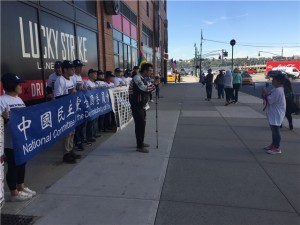25 years ago in 1989, the student movement in Beijing brought to view the first wave of democratic challenge for the Communist government. On the surface, it seems that the democratic challenge brought to light in 1989 has no longer been a contentious issue for Beijing over the past 25 years, as the government successfully suppressed the people’s demands for democratic change in China.
In reality, this issue of democracy has always been boiling under the surface and is the main source for many of the domestic and international problems China faces today. Democracy itself is also the ultimate solution to many of Beijing’s problems. The recent trouble in Hong Kong regarding the election of Hong Kong’s chief executive provides a good opportunity for the leadership in Beijing to reevaluate its policy towards political reform and democracy as one thing is for sure — the unrest in Hong Kong will be Beijing’s trouble for a long time. The lack of representation and full suffrage for Hongkongers has created a situation where no matter who is elected the next chief executive, he or she will be faced with “mission impossible” in trying to keep a good balance between serving the people of Hong Kong and answering to Beijing.
At the same time Beijing announced the structuring of the 2017 Hong Kong election, the CCP also announced the indictment of two senior officials of Shanxi province in the north China region and replaced the chief party officer of the province. As a result of president Xi Jinping’s recent anti-corruption campaign, more than half of the executive members of Shanxi provincial leadership have been removed or arrested. This is an example of how corruption has developed at an extraordinary rate in today’s China. The current administration has made anti-corruption its top priority; as Xi Jinping said, it is a battle to determine the ruling party’s “life and death.” In one year’s time, over 50 provincial minister level officials have been removed from power.
Beyond internal change, democracy could also be a solution to some of China’s foreign policy troubles. One major problem is China’s neighbors do not trust Beijing and harbor deep suspicion towards China’s intentions and foreign policy aims. The smaller nations in East and Southeast Asia find it difficult to deal with a rising giant that has a major lack of transparency in both its policy making and the operation of the government.However, this campaign is doomed to fail if Beijing doesn’t conduct political reforms. Even though democracy will not thwart all corruption, the practice of many democratic states has proven that an effective way to counter corruption develops when officials are directly elected by the public whom they represent rather than appointed from above. Also, an environment of rule of law and freedom of press would also effectively help to curb corruption.
There is a popular narrative in China, amongst even many intellectuals, that democracy will bring disorder and chaos to China. These individuals point out the examples of Thailand and Ukraine and the disorder brought on them upon democratic transformation. While this theory may hold some truth — as the saying goes, democracy is the worst form of government, except for all the others that have been tried — without making the transition to democracy, Beijing will definitely face larger problems going forward.
Xi Jinping’s administration is a very ambitious one, and wants to bring China to a higher level of success. There have been discussions in China about whether Xi should be China’s new Mao or “second Deng”; “China’s Putin” or the Chinese version of Lee Kuan Yew of Singapore. But the best role model Xi can take is that of Taiwan’s Chiang Ching-kuo. In the late 1970s, when the Nationalist Kuomintang (KMT) government was still very powerful and possessed many political resources, Chiang made the brave and visionary move to start political reform. He removed restrictions on the formation of political parties, and endorsed freedom of the press. This process is known as Taiwan’s “quiet revolution,” a non-violent movement that transformed Taiwan from a dictatorship to a democracy.
Taking the example of Chiang, it is important for the CCP to face the problem of democracy and try to make the transition. The government is currently undergoing many reforms, but political reform is most necessary. The best thing Xi can do in his term is to make a contribution to this transition before the situation becomes too difficult to control.
Zheng Wang is the Director of the Center for Peace and Conflict Studies at Seton Hall University in New Jersey and a Global Fellow at the Woodrow Wilson International Center for Scholars.







